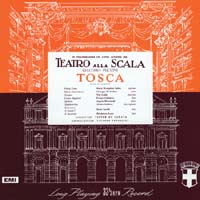The 1953 EMI recording of Giacomo Puccini's Tosca conducted by Victor de Sabata, with Maria Callas, Giuseppe Di Stefano and Tito Gobbi, is considered by many opera critics to be one of the most notable opera recordings of the 1950s. It was recorded in August 1953 by the EMI subsidiary Columbia Records[1] and released to critical acclaim. It was a commercial success from the start and continues to be one of the best-selling opera recordings.[2]

An anecdote regarding the recording sessions relates that de Sabata, who was generally pleased with Callas's performance, was not satisfied with her reading of the line "E avanti a lui tremava tutta Roma". Producer Walter Legge wrote that de Sabata put Callas through the "grinding mill" for half an hour to get it just right, though in Legge's view it was time well spent.[3][4]
The work of all three lead singers, Callas as Tosca, Tito Gobbi as Scarpia and Giuseppe Di Stefano as Cavaradossi has been nearly universally praised, as has the "spaciously lyrical" conducting of de Sabata.[5] Walter Legge's production and "superbly balanced" mono recording have also been noted as aspects that have made this Tosca one of the most celebrated of classical recordings.[6] Soprano Leontyne Price[7] and justice Ruth Bader Ginsburg[8] named Callas' Tosca as their favourite recording. When Herbert von Karajan was making his own recording of Tosca in 1962, he would often ask his producer John Culshaw to play selections from the de Sabata/Callas recording to him. Culshaw reports that "One exceptionally tricky passage for the conductor is the entry of Tosca in act 3, where Puccini's tempo directions can best be described as elastic. Karajan listened to de Sabata several times over during that passage and then said, 'No, he's right but I can't do that. That's his secret.'"[9]
In 2020, the recording was selected by the Library of Congress for preservation in the National Recording Registry for being "culturally, historically, or aesthetically significant".[10]
References
edit- ^ Recorded by EMI/Columbia on 10–14, 16, and 18–21 August 1953 "Maria Callas – Discography of opera performances and interviews" by Frank Hamilton, p. 15
- ^ Opera: An Encyclopedia of World Premieres and Significant Performances, Singers, Composers, Librettists, Arias and Conductors, 1597–2000, Franklin Mesa (2007), p. 85: "His 1952 performance on EMI of Tosca with Maria Callas, Giuseppe di Stefano and Tito Gobbi remains the best-selling opera recording of all time."
- ^ On and off the record: a memoir of Walter Legge, ed. Elisabeth Schwarzkopf (1982), p. 197: "Only for 'E avanti a lui tremava tutta Roma' was she put through de Sabata's grinding mill for half an hour – time well spent. We used miles of tape, and when the recording was finished I warned de Sabata that I needed him for a few days to ..."
- ^ Gramophone, Volume 85, Number 1019 (2007), p. 41: "Callas's musicianship would have come as no surprise to de Sabata but, when it came to Tosca's great aria, even he must have been thrilled by her total concentration, the way in which she seemed to live every bar of 'Vissi d'arte'. None the less, Walter Legge wrote about her being 'put through de Sabata's grinding mill for half an hour until he was satisfied with her line at the end of Act 2, 'E avanti a lui tremava tutta Roma'.' It's hard to believe that tempers didn't continue ... According to the now retired engineer Hans Lauterslager, who worked on the recording, Callas displayed signs of nerves."
- ^ The Penguin Guide to Recorded Music, ed. Ivan March, Edward Greenfield, Robert Layton (2008), p. 963: "Gobbi makes the unbelievably villainous police chief into a genuinely three-dimensional character, and Di Stefano, as the hero Cavaradossi was at his finest. The conducting of De Sabata is spaciously lyrical as well as sharply dramatic, and the mono recording is superbly balanced in Walter Legge's fine production."
- ^ Russell Miller, Jacques Lowe, Roger Boar The Incredible Music Machine (1982), p. 212: " ... recorded with Tito Gobbi and Giuseppe di Stefano, conducted by Victor de Sabata and produced by Legge at La Scala in 1953 remains one of the most celebrated classical recordings of all time."
- ^ BBC Music Magazine, Volume 4 (1996), British Broadcasting Corporation, p. 49: "... for years this has been nearly everyone's preferred Tosca. Leontyne Price chose the de Sabata as her favourite opera recording of all time."
- ^ "My Favorite Records: Ruth Bader Ginsburg" by Alex Ross, The New Yorker, 14 May 2012 (subscription required)
- ^ Osborne, p. 493
- ^ "National Recording Registry Class Produces Ultimate 'Stay at Home' Playlist". Library of Congress. March 25, 2020. Retrieved March 25, 2020.